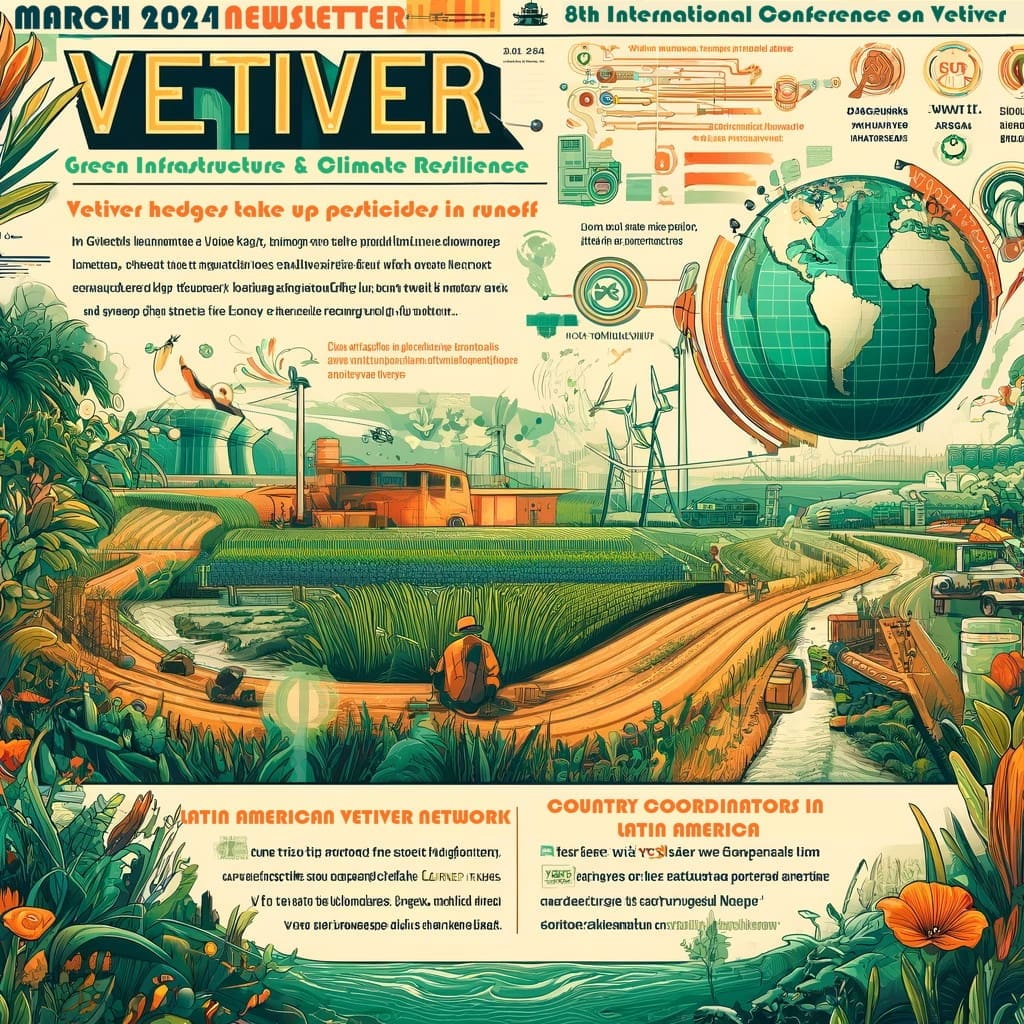
Announcement of the 8th International Vetiver Conference
The India Vetiver Foundation (IVF) – a recently constituted Indian organization dedicated to the promotion, cultivation, and utilization of vetiver grass as a sustainable solution for soil conservation, climate mitigation, and economic empowerment – submitted the successful proposal to host ICV-8 in Chennai, India in July/August of 2026. Begin your planning now to attend!
The IVF’s principals include Dr. CK Ashok (President), Mr. P.N. Subramanian (Vice-President), Mr. M.C. Dominic (Media Relations), Mr. JACS Rao (Sponsorships & Government Relations), Mr. Ganesan A. (Coordinator), and Mr. P. Haridas (former President, Indian Vetiver Network). These are names that may be familiar to you from their activism in support of the Vetiver System’s promotion and expansion of use in India and beyond, which have appeared in several prior TVNI news reports and Newsletters. Amongst others, Mr. Dominic and Dr CK Ashok were the motivating forces behind Krishi Jagran’s – the Indian media house with the largest global presence in the agriculture sector, of which Mr. Dominic is the Founder and Editor-in-Chief – having produced a special edition of its Agriculture World magazine on the Vetiver System for ICV-7.
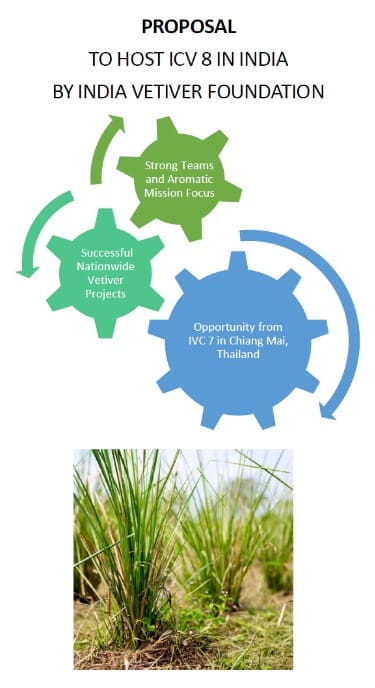 The IVF has an ambitious agenda that would set the stage for a highly successful and educational ICV-8. During this year, IVF will be focusing on organizational development by establishing chapters in various regions (with a target of having chapters in 20 states operational by 2025) and identifying passionate individuals to join the operating group. They plan to first pilot several VGT models in Tamil Nadu, while leveraging local support from communities and government, then replicating the successes achieved in Tamil Nadu in other parts of the country.
The IVF has an ambitious agenda that would set the stage for a highly successful and educational ICV-8. During this year, IVF will be focusing on organizational development by establishing chapters in various regions (with a target of having chapters in 20 states operational by 2025) and identifying passionate individuals to join the operating group. They plan to first pilot several VGT models in Tamil Nadu, while leveraging local support from communities and government, then replicating the successes achieved in Tamil Nadu in other parts of the country.
In 2025, IVF’s strategy is to aggressively showcase the achievements of 2024 to officials, farmers, and other regions. This would include organizing a Regional Conclave in mid-2025 that would bring together practitioners and interested participants from India, Sri Lanka, Nepal, Bangladesh, Mauritius, and Madagascar, amongst others. This two-day event will feature awards to recognize best practices and research within the participating specified countries. Further details on the Regional Conclave will be forthcoming later in 2024.
By early 2025, IVF aims to have established strong connections with Central and State Government Bureaucracy, Research Institutions such as CIMAP, ICAR, Aromatic Mission, NITI AYOG*, and the Office of the Prime Minster to actively lobby for the inclusion of VS in multiple sectors , such as agriculture, water management, road works, forestry, etc., in the implementation plans, leading to budget allocations.
The lessons and learning from the IVF experience should provide for a very rich and informative ICV-8 on high value topics such as mainstreaming VS into public policy and programs/initiatives, in addition to the wide range of technical experience and learning on the state-of-VS practice that is a key feature of ICVs. TVNI wishes to express its great appreciation and gratitude to IVF for stepping forward to organize and ensure the continuation of the International Conferences on Vetiver!
For further information you may contact PN Subramanian ([email protected])
* The NITI Aayog (National Institution for Transforming India) serves as the top public policy think tank of the Government of India, and the nodal agency tasked with catalyzing economic development, and fostering cooperative federalism through a bottom-up approach involving State Governments in the economic policy-making process.
The Latin America Vetiver Network (RLAV) Takes Off!
Under the tutelage of Rafael Luque (Coordinator of the Latin American Vetiver Network) and Yorlene Cruz (TVNI Director and TVNI Coordinator for Costa Rica), the RLAV continues to greatly expand its promotion and outreach for the dissemination of VS. Since the beginning of 2023, monthly “Virtual Conversations” have been held that cover a diverse range of topics of high interest to member of the RLAV; the latest is on the “Vetiver System for the treatment of wastewater for small coffee producers”. Recordings (in Spanish) of the conversations can be found on TVNI’s YouTube channel. There is also an active WhatsApp group, Mundo Vetiver, with 190 members sharing experiences and learning (and photographs and videos of their work) and providing technical recommendations to newer users. Vetiver Antierosion in Venezuela has recently introduced an offering of introductory courses online in Vetiver propagation and soil stabilization. On Facebook, Vetiver-related pages – both groups promoting the use of VS and private service providers (nurseries, technical designs and installations, handicraft sales, others) – can be found in 15 of the 21 countries in Latin America and the Caribbean that are Spanish (20) or Portuguese (1) speaking. There are multiple pages in many countries*, ensuring that motivated local users can find both information and plant material to get started.
RLAV is also now working to strengthen its country-level presence and promotion and outreach networking capacity by close cooperation and engagement with existing and new country coordinators. These and other developments – including some preliminary discussion of holding a Pan-American Regional Vetiver Conference in 2024 or 2025 –hold great promise for accelerating the expansion and application of the Vetiver System both in Latin America and globally.
* Argentina, Brazil, Bolivia, Chile, Colombia, Costa Rica, Dominican Republic, Ecuador, Guatemala, Honduras, México, Panamá, Perú, Uruguay, Venezuela
Meet the Latin American Vetiver Coordinators
Below are the names, contacts, and a short bios of the Vetiver Champions that are volunteering their time and their passion for promoting VS by taking on the role of Coordinator for the region and their countries.
 Rafael Luque Mirabal. Coordinator for Latin America. Rafael holds a Certificate in Technical Excellence in Vetiver Bioengineering, and has been a Vetiver nurseryman since 1999. He designs, manages and consults on Vetiver Bioengineering works since 2001. He is a recognized by TVNI as a Qualified Instructor of the Vetiver System. Email: [email protected], WSP: +58412 4578966, @luquevetiver
Rafael Luque Mirabal. Coordinator for Latin America. Rafael holds a Certificate in Technical Excellence in Vetiver Bioengineering, and has been a Vetiver nurseryman since 1999. He designs, manages and consults on Vetiver Bioengineering works since 2001. He is a recognized by TVNI as a Qualified Instructor of the Vetiver System. Email: [email protected], WSP: +58412 4578966, @luquevetiver
 Jessica Magi. TVNI Coordinator for Argentina. In 2010 Jessica started a nursery in the city of Cordova. Together with her husband Alfredo Santillán and her partner Daniel Lattimori, they founded Vetiver Argentina, a Bioengineering and Phytoremediation company, becoming pioneers in the country. [email protected] / +54911 48703703
Jessica Magi. TVNI Coordinator for Argentina. In 2010 Jessica started a nursery in the city of Cordova. Together with her husband Alfredo Santillán and her partner Daniel Lattimori, they founded Vetiver Argentina, a Bioengineering and Phytoremediation company, becoming pioneers in the country. [email protected] / +54911 48703703
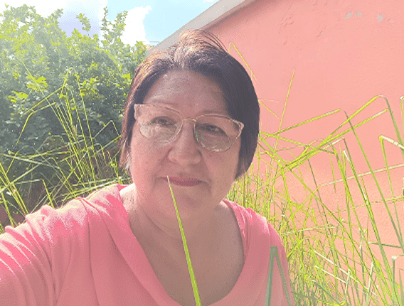 Rosario Cerezo. TVNI Coordinator for Bolivia Rosario is the newest of the Latin American Country coordinators. In 2021 she started a nursery in Santa Cruz de la Sierra. Entrepreneurial, Merchant, and Photographer, she set herself the mission of raising awareness of the multiple applications of VS in her country. She is in the process of training in Vetiver Bioengineering and Phytoremediation. [email protected] / (+59) 170 93 7779
Rosario Cerezo. TVNI Coordinator for Bolivia Rosario is the newest of the Latin American Country coordinators. In 2021 she started a nursery in Santa Cruz de la Sierra. Entrepreneurial, Merchant, and Photographer, she set herself the mission of raising awareness of the multiple applications of VS in her country. She is in the process of training in Vetiver Bioengineering and Phytoremediation. [email protected] / (+59) 170 93 7779
 Paula Leão Rodrigues Pereira. TVNI Coordinator for Brazil. Paula has a Degree in Architecture and Urban Planning (2006), Civil Engineering (2010), Occupational Safety Engineering (2017) and Geotechnical Engineering (2023). She is currently the director of Deflor Bioengenharia in Minas Gerais, Brazil. She has been working with Vetiver grass in erosion control projects and works since 2002. [email protected] / +55 31 98346-8494
Paula Leão Rodrigues Pereira. TVNI Coordinator for Brazil. Paula has a Degree in Architecture and Urban Planning (2006), Civil Engineering (2010), Occupational Safety Engineering (2017) and Geotechnical Engineering (2023). She is currently the director of Deflor Bioengenharia in Minas Gerais, Brazil. She has been working with Vetiver grass in erosion control projects and works since 2002. [email protected] / +55 31 98346-8494
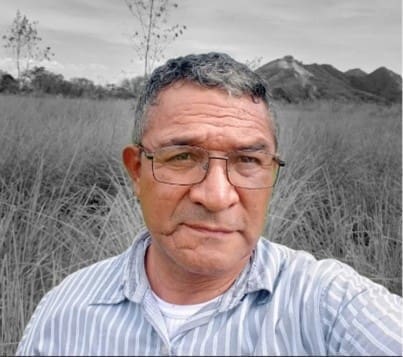 Claudio Rubén Daza Jiménez. TVNI Coordinator for Colombia. Claudio is the manager and owner of Vetivercol Servicios y Consultorías S.A.S., He has a 9 ha Vetiver nursery, and conducts research on the use of Vetiver for Biomass and Atmospheric Carbon Capture, Design and Management of VS Bioengineering Works. He has a TVNI Certificate in Bioengineering. [email protected] / +57320 3846054.
Claudio Rubén Daza Jiménez. TVNI Coordinator for Colombia. Claudio is the manager and owner of Vetivercol Servicios y Consultorías S.A.S., He has a 9 ha Vetiver nursery, and conducts research on the use of Vetiver for Biomass and Atmospheric Carbon Capture, Design and Management of VS Bioengineering Works. He has a TVNI Certificate in Bioengineering. [email protected] / +57320 3846054.
 Yorlene Cruz Chaves. TVNI Coordinator for Costa Rica and TVNI Director. Yorleny is an economist and holds an MBA and master’s degree in Sustainable Development with emphasis on Conservation of Biological Resources. She has been a Producer, Promoter and Executor of VS Projects since 1998. She has a Certificate in Technical Excellence in Vetiver Bioengineering from TVNI, and has been a TVNI Director since 2016. [email protected] / www.vetivercostarica.com WSP: + (506) 8991-9180 FB/IG: @SistemaVetiverCostaRica
Yorlene Cruz Chaves. TVNI Coordinator for Costa Rica and TVNI Director. Yorleny is an economist and holds an MBA and master’s degree in Sustainable Development with emphasis on Conservation of Biological Resources. She has been a Producer, Promoter and Executor of VS Projects since 1998. She has a Certificate in Technical Excellence in Vetiver Bioengineering from TVNI, and has been a TVNI Director since 2016. [email protected] / www.vetivercostarica.com WSP: + (506) 8991-9180 FB/IG: @SistemaVetiverCostaRica
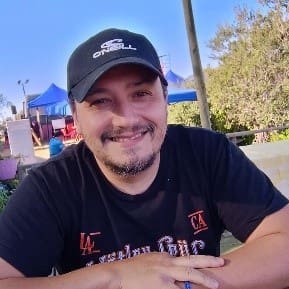 Pablo Andrés Molina Bahamondes. TVNI Coordinator for Chil. Pablo is the founder of Bioingeniería Vetiver Chile SpA, and he made the first imports of Vetiver into Chile in 2000. He has conducted important soil and copper mine tailings stabilization works. www-vetiver.cl +56 938 991104
Pablo Andrés Molina Bahamondes. TVNI Coordinator for Chil. Pablo is the founder of Bioingeniería Vetiver Chile SpA, and he made the first imports of Vetiver into Chile in 2000. He has conducted important soil and copper mine tailings stabilization works. www-vetiver.cl +56 938 991104
 Piet Sabbe. TVNI Coordinator for Ecuador. Piet is a Vetiver Consultant, who has been cultivating and marketing Vetiver since 1996, with a focus on advice and application on family farms. +59 3967 296732 [email protected] www.vetiver.bospas.org
Piet Sabbe. TVNI Coordinator for Ecuador. Piet is a Vetiver Consultant, who has been cultivating and marketing Vetiver since 1996, with a focus on advice and application on family farms. +59 3967 296732 [email protected] www.vetiver.bospas.org
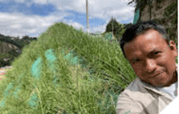 Salvador Ramíre. TVNI Coordinator for Guatemala. Salvador is an Agronomist, and Founder and Director of Ingeniería Viva. He has been working with vetiver since 2011. He is a promotor and developer of Vetiver projects in Guatemala. [email protected] / +50255 175187
Salvador Ramíre. TVNI Coordinator for Guatemala. Salvador is an Agronomist, and Founder and Director of Ingeniería Viva. He has been working with vetiver since 2011. He is a promotor and developer of Vetiver projects in Guatemala. [email protected] / +50255 175187
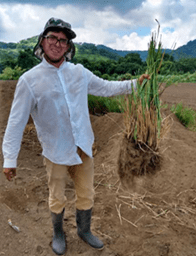 Antonio Carrillo Bolea. TVNI Coordinator for Mexico. Antonio is a founding partner and director of Estampa Verde, an organization focused on the promotion of the Vetiver System with producers, and Vetiver research and advocacy in public policies. He received the King of Thailand Award in 2023 for his “Minimum Standard of the Vetiver System in Keyline Hydrological Design”. [email protected] / +52 55 7979 3690 [email protected]
Antonio Carrillo Bolea. TVNI Coordinator for Mexico. Antonio is a founding partner and director of Estampa Verde, an organization focused on the promotion of the Vetiver System with producers, and Vetiver research and advocacy in public policies. He received the King of Thailand Award in 2023 for his “Minimum Standard of the Vetiver System in Keyline Hydrological Design”. [email protected] / +52 55 7979 3690 [email protected]
 Marieta Isabel Álvarez de Landis. TVNI Coordinator for Panama. Marieta started Vetiver Panama, S.A. in 2013 as a result of a landslide that caused her the loss of a 1 hectare property in 2008. Since that time, she has been committed to working with and supporting communities, to whom she has taught Vetiver Grass Technologies and they, with their own hands, prepare the plants for Marieta’s our customers. [email protected] Celular: (507) 6674-2419. Facebook: Vetiver Panamá, S.A.
Marieta Isabel Álvarez de Landis. TVNI Coordinator for Panama. Marieta started Vetiver Panama, S.A. in 2013 as a result of a landslide that caused her the loss of a 1 hectare property in 2008. Since that time, she has been committed to working with and supporting communities, to whom she has taught Vetiver Grass Technologies and they, with their own hands, prepare the plants for Marieta’s our customers. [email protected] Celular: (507) 6674-2419. Facebook: Vetiver Panamá, S.A.
 Patricia Tello Reátegui. TVNI Coordinator for Peru. Patricia is an expert in Environmental Management and has led innovative initiatives to reduce the carbon footprint of development projects, highlighting her commitment to sustainable practices and renewable energies. She has successfully implemented VS as a technology, validated by the Rainforest Alliance after 3 years of research, for coffee wastewater treatment. +51 920 104 740 [email protected]
Patricia Tello Reátegui. TVNI Coordinator for Peru. Patricia is an expert in Environmental Management and has led innovative initiatives to reduce the carbon footprint of development projects, highlighting her commitment to sustainable practices and renewable energies. She has successfully implemented VS as a technology, validated by the Rainforest Alliance after 3 years of research, for coffee wastewater treatment. +51 920 104 740 [email protected]
 Samuel Hernández Morales. TVNI Coordinator for Puerto Rico. Samuel is a communicator by profession and a farmer by vocation. For 8 years he has been working with Vetiver in his company Sistema Vetiver Corporation. He specializes in erosion and landslide control (which he says is the biggest need on his tropical island). He is a Specialist in VS Design and Installation. [email protected] / +1 (787) 232 9353
Samuel Hernández Morales. TVNI Coordinator for Puerto Rico. Samuel is a communicator by profession and a farmer by vocation. For 8 years he has been working with Vetiver in his company Sistema Vetiver Corporation. He specializes in erosion and landslide control (which he says is the biggest need on his tropical island). He is a Specialist in VS Design and Installation. [email protected] / +1 (787) 232 9353
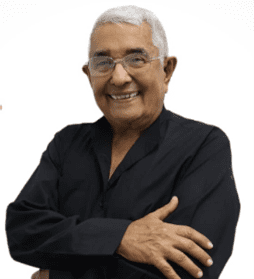 Oswaldo Luque Mirabal. TVNI Coordinator for Venezuela. Oswaldo is an Agronomist with a master’s and PhD in Soil Sciences. He has been working with vetiver since 2001. Among others, he has worked Vetiver for Phytoremediation in projects for wastewater treatment plants at the district level. He is the creator of the Infiltro vetiver system for the treatment of non-hazardous organic waste of industrial origin. He has received several international awards for his work with VS. [email protected] / +58424 3181220
Oswaldo Luque Mirabal. TVNI Coordinator for Venezuela. Oswaldo is an Agronomist with a master’s and PhD in Soil Sciences. He has been working with vetiver since 2001. Among others, he has worked Vetiver for Phytoremediation in projects for wastewater treatment plants at the district level. He is the creator of the Infiltro vetiver system for the treatment of non-hazardous organic waste of industrial origin. He has received several international awards for his work with VS. [email protected] / +58424 3181220
Successful application of Vetiver in the reduction of pesticide concentrations in agricultural waters in Mérida Venezuela
By Jorge L. Uzcátegui Nava1 and Luz Mendoza2
1 Researcher and Director of the Laboratory for Physical-Organic Chemistry, Department of Chemistry, Universidad de Los Andes, Mérida, Venezuela ([email protected])
2 Researcher and Consultant, Laboratory for Physical-Organic Chemistry, Department of Chemistry, Universidad de Los Andes, Mérida, Venezuela ([email protected])
[Editor’s note: The following is a summary of the paper shared with TVNI. The full version, in both Spanish and English, may be found by following the links provided here.]
The State of Mérida is part of the Andean Mountain range of Venezuela. One of its main economic activities is agricultural production. The water that circulates through the rivers and soils flows into a main river called Mucujún, which supplies the State’s drinking water system.
Previous research had indicated the presence of pesticides in these waters, motivating this research into the impact of living Vetiver barriers on the concentration levels of pesticides in the runoff from a farm that fed into the river.
The study involved the analysis of water samples, taken prior to the installation of the Vetiver barrier and on the day of completion of the planting of the Vetiver barriers, to be used as the reference sample, then following a 30 days establishment period, sampling between the dates of 11 August 2023 and 10 November 2023, to evaluate the changes in pesticide concentrations over time.
Baseline Analysis
A farm bordering a tributary of the Mucujún River in the state of Mérida was selected based on its agricultural activity and use of agrochemicals of interest. Water samples were obtained from a stream feeding into the Mucujún River, which passed through the farm (Photo 1) and analyzed weekly, over a five-week period, prior to the planting of the Vetiver hedgerows. The samples were analyzed for the presence of organophosphates (POF), carbamates (PC), and organochlorine pesticides (POC).
The results indicated that the surface waters passing through the land under study contained organophosphate and carbamate pesticides in total concentrations ranging between 0.131 and 0.556 ppm. Venezuelan Legislation establishes 0.100 mg/l of these contaminants as the limit for human consumption.
In respect of the organochlorine pesticides, the analyses showed that methoxychlor, delta HCH and p,p’-DDT were the most commonly occurring in the water samples. The concentration in which they were detected, however, was not statistically different from, or above, the maximum allowable for human consumption (200µg/l) by current national regulations.
Establishing Vetiver living barriers
Between July 10 and July 14, 2023, Vetiver was planted to form living barriers on both sides of, and close to, the stream running through the study site. A four-week establishment period was allowed prior to the initiation of the water sampling; with the sampling occurring at the same locations that had been used to establish the baseline.
Analysis after planting Vetiver
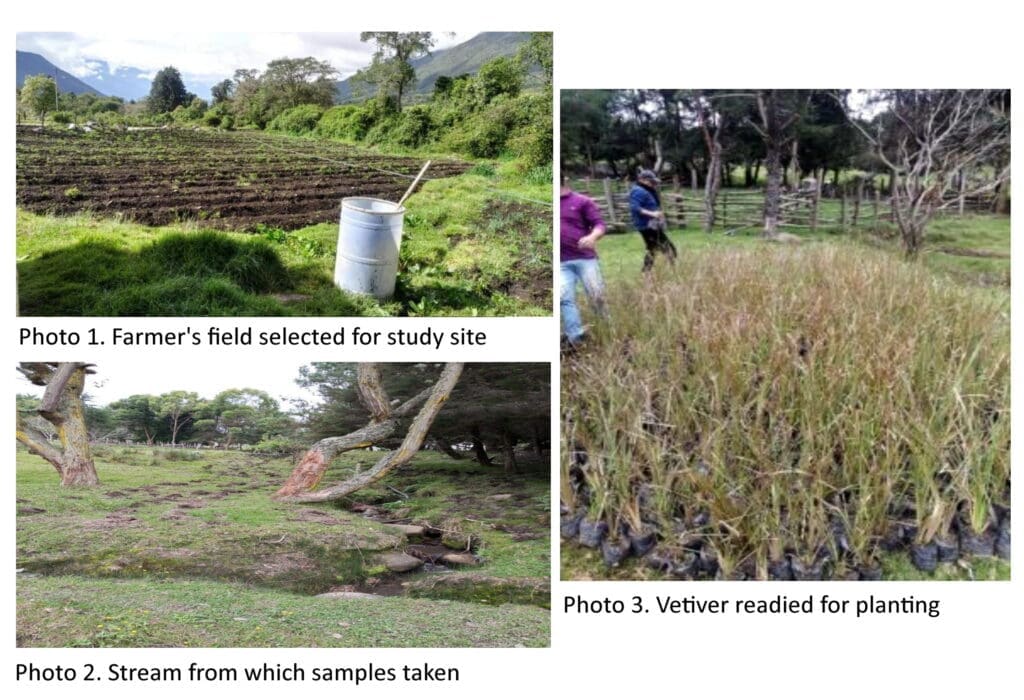 For purposes of the analysis, sampling began on 14 July 2023, the day that the planting of the Vetiver was completed. This sample was used as the reference value for assessing the Vetiver barrier’s capacity for uptake of POFs, PCs, and POCs. The subsequent samples were taken between 11 August 2023 (four weeks after completion of planting) and 10 November 2023 (seventeen weeks after completion of planting). The results are shown in Graphs 1 and 2.
For purposes of the analysis, sampling began on 14 July 2023, the day that the planting of the Vetiver was completed. This sample was used as the reference value for assessing the Vetiver barrier’s capacity for uptake of POFs, PCs, and POCs. The subsequent samples were taken between 11 August 2023 (four weeks after completion of planting) and 10 November 2023 (seventeen weeks after completion of planting). The results are shown in Graphs 1 and 2.
Graph 1 shows a continual decrease in the concentrations of the POFs and PCs in the surface water over the sampling period. From this, it can be inferred that the Vetiver barriers reduced the concentrations of the POFs and PCs.
Graph 1. Decrease in the total concentration of POFs and PCs over time.
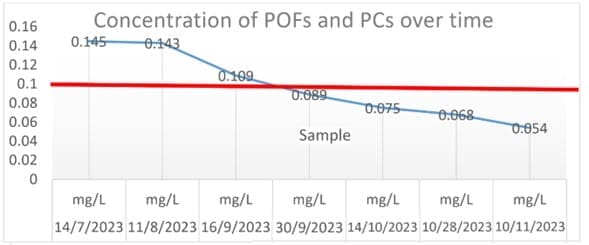
The red line in the graph above denotes the limit value allowed according to Venezuelan Legislation for organophosphate pesticides and total carbamates 0.100 mg/L
Graph 2. shows the continual decrease in the concentration of total organochlorine pesticides (POCs) in the weeks following establishment of the Vetiver barriers. These values are below the maximum value allowed in current national regulations (200 µg/l).
Graph 2. Decrease in the total concentration of POCs over time.
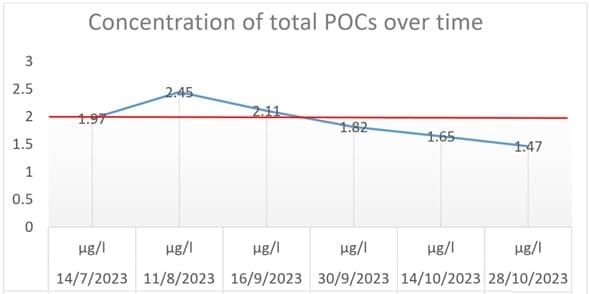
The red line in the graph above denotes the limit value allowed according to Venezuelan Legislation for total organochlorine pesticides of 200 µg/l (0.200 mg/L)
Conclusion
In this study, Vetiver barriers reduced the concentration of the pesticides entering a stream from an agricultural field to levels lower than those considered by current Venezuelan legislation to exceed the limits for human consumption. When planted in agricultural soils, the Vetiver barriers progressively reduced the concentration levels of organophosphate, carbamate, and organochlorine pesticides and so improved water quality.
Actions
- Vetiver nurseries are being created in strategic points in the state of Mérida.
- Explanatory content on the use of vetiver for environmental protection has been developed. Workshops and seminars are being held, and discussions on the topic will be held with students and farmers in different areas of the Páramo Merideño.
[Editor’s note: the progressive reduction over the sampling period shows that even newly planted Vetiver hedges can have a positive impact on reducing agrochemical runoff from agricultural fields. Mature, well-established hedges can be expected to be even more effective.]
IDBSuperheroes: Green infrastructure for climate resilience (Trinidad & Tobago)…
Looking over some recent emails, I reread one from Jonathan Barcant (Trinidad & Tobago based, Caribbean Coordinator and TVNI Director) that included a link to a 2022 promotional video done by the Inter-American Development Bank (IDB) for the “Building on Vetiver!” project that the IAMovement and Vetiver TT successfully completed, with funding support from government and IDB. The project was awarded IDB’s Superheroes of Development Award for its successful performance, prompting IDB’s promotional video.
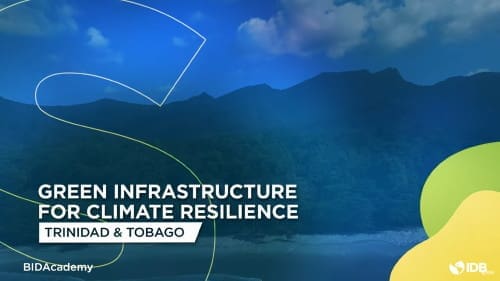 Two things struck me about this video. One is its overall value for introducing and promoting the Vetiver System amongst decision-makers and organizations (government and non-government). It is reasonably short, of high quality, and effectively communicates the message that Vetiver is an important and innovative option for achieving goals for climate resilient, green infrastructure as well as for communities and farmers in agriculture. That it was done by the Inter-American Development Bank, the largest international financier of public infrastructure in Latin America, makes the message even more powerful.
Two things struck me about this video. One is its overall value for introducing and promoting the Vetiver System amongst decision-makers and organizations (government and non-government). It is reasonably short, of high quality, and effectively communicates the message that Vetiver is an important and innovative option for achieving goals for climate resilient, green infrastructure as well as for communities and farmers in agriculture. That it was done by the Inter-American Development Bank, the largest international financier of public infrastructure in Latin America, makes the message even more powerful.
The second thing that stood out to me is the backstory that comes through about the effectiveness of the VEEP strategy – developed by Jonathan Barcant and his team – in leveraging in significant additional finance and support from IDB to expand and replicate their ongoing programs of introducing and deploying VS in communities in Trinidad and Tobago, and beyond to other Caribbean countries. Notice the name of the project: “Building on Vetiver!”. It is an example well worth studying, especially if you and your organization are asking yourselves “How can we find the financial resources necessary to meet the demand from communities, and take advantage of the opportunities we encounter, to introduce and apply the VS?” The VEEP strategy is one answer to this question, though it is not an easy or quick strategy to implement.
Critical to the VEEP is the identification of community, national, NGO, international and other partners who are looking to solve environmental problems; have access to funding or, if communities, in-kind resources; and that can be leveraged in as partners, affiliates, or in a coalition arrangement. In other words, it takes a strong focus on documenting your work and successes, and then communicating and marketing those successes to potential partners that can help to scale up the dissemination and use of VS. It is also a reminder of the old quote that “It is amazing what you can accomplish if you do not care who gets the credit.” For the VEEP strategy to work as it does, all those involved must feel ownership so that after the project is done, they are motivated to take their pride of ownership and accomplishment to new people, new places, and new applications….and that is a solid basis for grassroots development.
Can we get a link to join the mundo Vetiver whatsapp group?